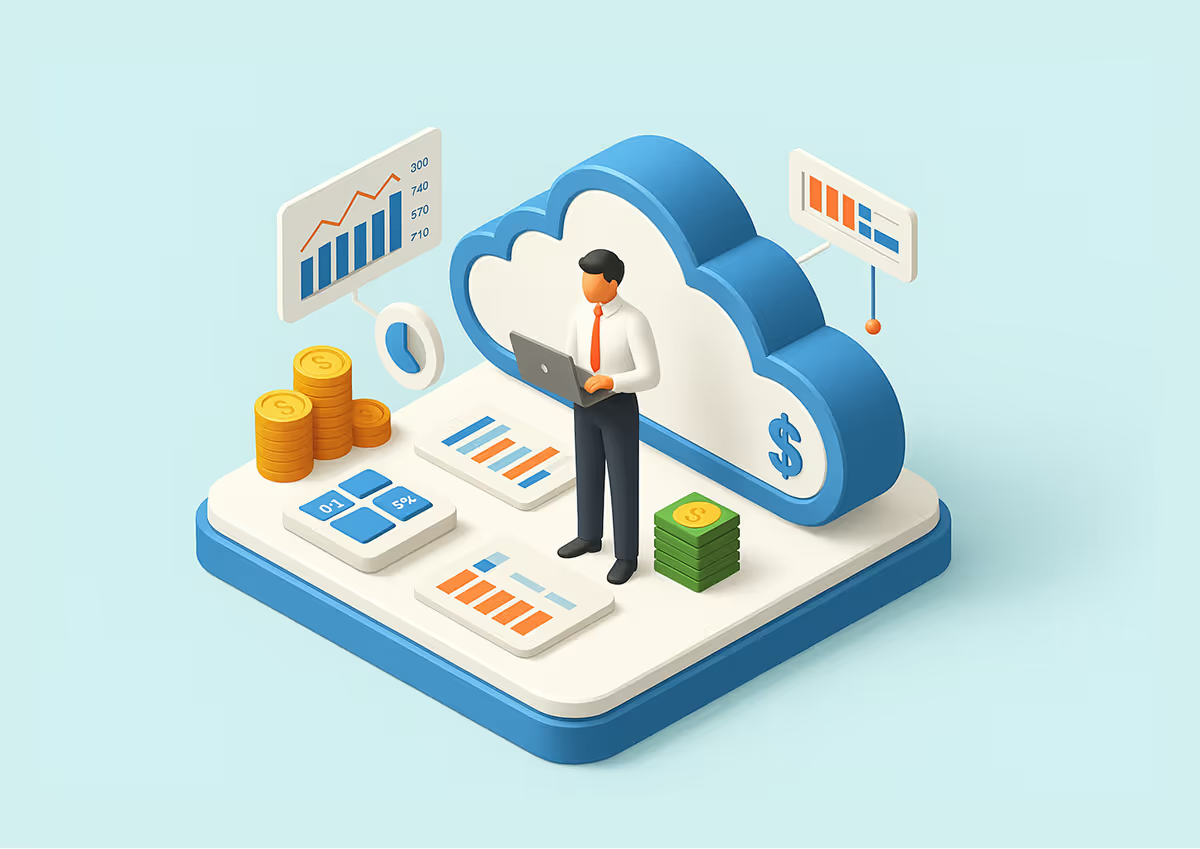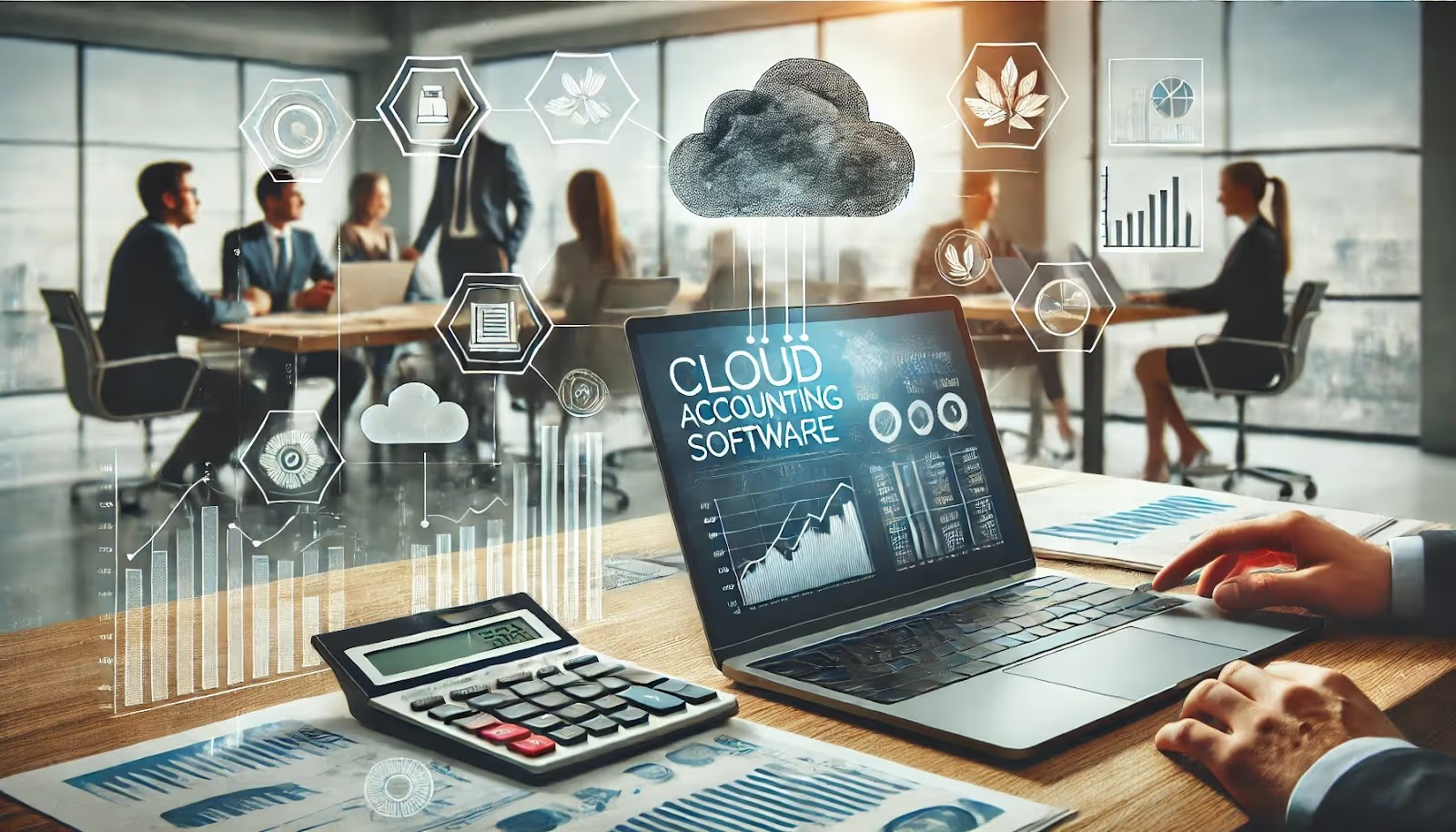The Perks of Automated Bookkeeping for Accounting Pros
Still doing the books in Excel? Read on to learn why and how to automate bookkeeping to your advantage, even if you handle clients with few transactions.
Key features of cloud-based accounting software and why it`s a better accounting solution for businesses and CPA firms.

The top 5 signs that indicate your business needs to switch to cloud accounting software. Learn how Eleven software in the cloud simplifies financial management with advanced tools and scalability.
In this article
Financial management is an essential part of business. This is particularly so important to accounting and CPA firms because they manage not only their own finances but at the same time, consult their clients. However, obsolete accounting systems do have the potential to hurt your business. With the advancements in technology, cloud accounting software is becoming more and more vital to modern businesses. Accounting in the cloud is the future.
Businesses use cloud accounting systems to be successful in the modern accounting industry. It`s necessary if you're trying to build a successful practice in the long term.

How do you know when it is time for a switch? Following are five signs that your business needs cloud-based bookkeeping software.
Cloud accounting is the modern way of maintaining your financial data. Unlike traditional accounting systems, which store data locally on computers or servers, cloud solutions hold it on secure web platforms. In other words, cloud accounting enables the processing of your financial records from any device that can connect to the internet.
One of the core aspects of cloud accounting involves accessibility. Data is kept in a cloud so that you may view each update of your finances in real-time, no matter where you are in the world. You also need not back up physical data or on-premise servers, reducing the overall cost of maintenance and risks related to data loss.
The system difference in flexibility and efficiency between cloud accounting and traditional systems is what truly sets them apart. First, while traditional systems require you to manually update your system and upgrade hardware, these updates occur automatically with cloud solutions via the provider. This ensures that you are using features and security protocols that are up-to-date.
Cloud accounting also offers several advantages for businesses:
By embracing cloud accounting, businesses can free themselves from the bottlenecks, reduce costs, and focus more on growth rather than system maintenance.
CPA firms often serve clients in more than one location, and access to financial data from remote locations is essential to provide timely service. If your current accounting system does not allow you access to the data outside the office, that's a problem.
Cloud accounting platforms provide flexibility. With access to the Internet everywhere, financial information, client records, tax filings, and financial reports are available. It helps the remote teams and assists the business owners who need to check some financial data while traveling. Real-time access means you are always up to date, no matter where you are.

Imagine sitting in a client meeting and needing urgently to have the new financial data or tax returns appearing on your laptop in real-time. With traditional accounting systems, you need to call the office, wait for an email, or conduct this task on your return. Cloud accounting removes delays for this purpose. An accountant working from home will be able to review client invoices and approve invoices in a timely manner. This flexibility ensures that your team will be able to meet deadlines and provide good service no matter where they may be working.
This level of accessibility also leads to better collaboration: different location teams can work on the same financial data for easier coordination. If your business suffers from limited access to critical financial data, then cloud accounting software is the solution.
As your business grows bigger, so do your financial needs. A scaling-up business has to deal with more transactions, bigger teams, and complex operations. If your current system wasn't designed to handle growth, it could result in delays and inefficiencies.
Сloud accounting programs are scalable. It means you can always add more features, users, or modules as your business grows or expands.
Cloud accounting enables significant firm growth through collaborations that boast state-of-the-art audit tools, client management systems, and financial planning platforms. Such integration of your software grows with your firm, leaving you to focus on your growth in services and clientele.

Modern accounting and CPA firms use a variety of different tools in their efforts to serve their clients effectively. It is CRM software, payroll system, tax preparation software, client management platform, etc. In instances where your accounting system does not integrate with such tools, it creates an increased vulnerability to errors and inefficiencies.
For example, payroll data might need to be manually transferred into your accounting software or tax filings, which can be very time-consuming. Aside from taking up your time, this can also lead to mistakes in client reports or filings.
Cloud software for accounting is seamlessly integrated with the very tools used daily by the CPA firm. Example:
These integrations expedite the processes and save time. They provide accuracy of data, which becomes so crucial for audits, tax reporting, and decision-making. If your current system operates in isolation and demands regular manual updates, it is now high time to shift to cloud accounting software.
Financial data probably represents one of the most sensitive assets of any business. If your current system is based on local storage or underdeveloped security measures, then your data is in jeopardy. Hardware crashes, cyber-attacks, and accidental losses can have devastating results.
Advanced security features safeguard your data with the accounting software in the cloud. The providers encrypt data to ensure it is kept secure both at storage and during its relay. Automatic backups mean you cannot lose crucial data should a device fail or get breached. Role-based access controls let admins specify who's accessing which data and whether users can view or edit it.
Let's say a hard drive in one of those traditional systems goes down. The financial records could be lost, which results in delays in operations or even possible legal issues. With cloud accounting technology, all the data is stored safely in the cloud, from where it can be recovered right away.

Moreover, the providers in cloud updating systems to reduce emerging security threats. This proactive approach means your business remains secure without your company needing to invest in additional IT resources. If data security is a concern for your business, then an investment in cloud accounting software is highly recommended.
The maintenance of traditional accounting software is expensive. You are supposed to pay for the server hardware, IT staff, and manual updates. These slight expenses add up over time and can stress your budget.
Most of these costs vanish in accounting software. No physical servers and no specialized IT support are required, nor do you need to worry about software updates, because they are automatic, which means you get the latest features and security patches without having to lift a finger.
Automatic updates also prevent downtime. Your team can keep working without interruptions, and you will not have to go through the agony of scheduling an upgrade. In cloud accounting, your only foreseeable cost is a subscription-based fee, which means budgeting is easy and overall costs are lower.

Think of a company operating on some obsolete system, which needs upgrades now and then if it has to be functional. An upgrade requires buying hardware technicians and facing downtime. Cloud solutions evade these altogether.
Moreover, most cloud accounting software offers customer support already covered in the subscription, reducing the need for an in-house IT expert. The combination of cost savings along with simplicity makes cloud accounting far more efficient.
Switching to cloud accounting software can be apparently complicated, but with proper planning, the process is straightforward. Here's how any accounting firm can make a seamless transition:
Eleven is more than cloud accounting software; it's a robust, scalable solution designed to meet today's demanding businesses and accounting firms. Advanced functionality embeds with user-friendly design to make financial management efficient, secure, and tailored to meet the most demanding requirements of growth.
Eleven is designed to support high transaction volumes, up to 20,000 transactions without any performance issues. It comfortably adapts to changing needs in growing businesses, whether from managing a small startup to scaling into a global enterprise, and it will never require expensive upgrades or changes to software as your business continues to grow.
Eleven automates many routine bookkeeping tasks common to most businesses, including:
These automated features consequently reduce manual errors, free up time, and enable one's team to focus on strategic initiatives rather than administrative work.
Eleven provides a centralized document management system, making the storage, organization, and retrieval of financial documents easy. It allows your business to store all invoices, receipts, contracts, and other financial records in one secure location. This feature is an extra bonus that improves the organization and ensures that important files will always be found where they are needed.

Eleven is brilliant for producing real-time financial insight. Users can run entirely customizable reports on the metrics most meaningful to their enterprise.
These make for easy reports to distribute to stakeholders so that all parties may have access to the data to make informed decisions.
Eleven prioritizes security when it comes to sensitive financial information. Advanced encryption protocols are utilized, and it hosts on secured AWS servers. Day-to-day backups against unexpected failures, multi-factor authentication to prevent unauthorized access-all are a staple.
For companies operating across different continents, Eleven thus provides strengthened tools for international finances. It supports over 170 currencies, boasts auto-conversions of exchange rates, and multiple currency reports. Its multilingual interface ensures accessibility to global teams for better collaboration across borders.
Eleven easily integrates with a variety of business tools, including:
This helps to prevent data silos, reduces manual entry to a minimum, and allows for a fully integrated flow across departments.
With financial regulations growing evermore important, it will be important not to incur fines. Because of this, Eleven supports a number of standards for compliance, such as GAAP and IFRS, making the production of accurate, audit-ready financial records easier to produce.

While Eleven is designed with a lot of advanced functionality in mind, it still maintains simplicity as a core object. Its intuitive interface makes sure that even users with minimal technical experience can easily input the site and want more. Business onboarding goes seamlessly right from the get-go to ensure businesses don't take much time before they finally get used to Eleven.
Eleven's per-user pricing model is flexible and cost-effective. Companies do not have to pay for more than what they need in terms of features and capacity. Thus, this makes Eleven a great deal for any-sized company showing growth. This open pricing model eliminates all types of unexpected costs while allowing the company to scale investment according to growing needs.
Outdated accounting systems can slow down your business and create unnecessary challenges. Difficulty in accessing data, handling growth, integrating with tools, ensuring security, and managing costs are definite signs it's time to make the switch to cloud accounting software.
Cloud solutions offer flexibility, scalability, heightened security, and a reduction in both cost and enhanced efficiency. You will be empowering your team as you make the transition, saving time in the process, and positioning your business for success in the future to come. If you are ready to take the next step with your bookkeeping, it is time to explore your options in the cloud.